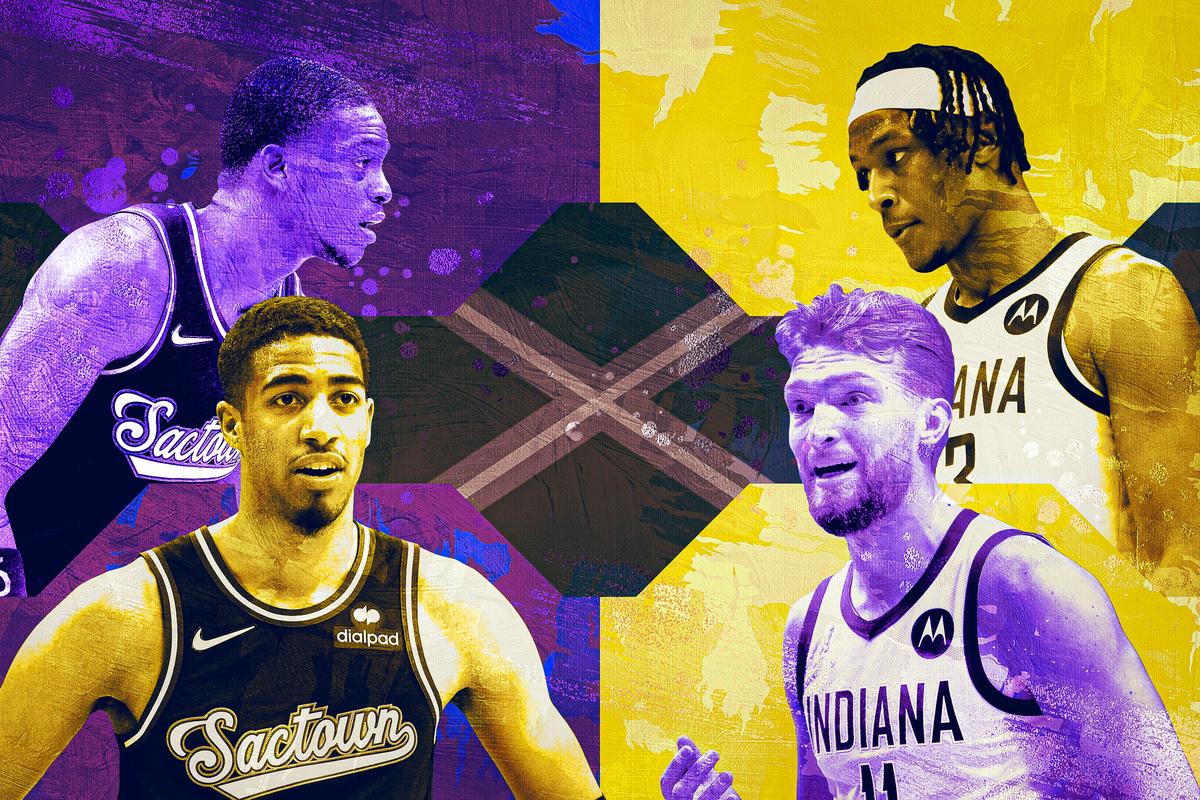
The Pacers and Kings are pretty strange trade-fellows—too alike in goals and in record for any major trade to make all that much sense. And yet here they are, front and center in one of the biggest deals leading up to the NBA’s trade deadline: a small-market blockbuster that sends Domantas Sabonis to Sacramento and Tyrese Haliburton to Indiana, along with a mutual reshuffling of role players.
This deal between sub-.500 teams offers competing visions of how an organization should resolve redundancy. The Kings cleared the bottleneck among Haliburton, De’Aaron Fox, and Davion Mitchell by going big and broad, adding a borderline All-Star in Sabonis who creates new, different logjams with his arrival. The Pacers tried for a more incisive approach, capitalizing on a season in which they’ve been both bad and injured to finally split up Sabonis and fellow center Myles Turner. This may be the closest a team under Herb Simon’s ownership will come to a full-on rebuild: tripping its way to one of the worst records in the league, and then trading its best player for a younger one with star potential.
Haliburton is persuasive in that way, both for what he already is and what he eventually could be. It’s hard to find a better philosophical match for a franchise that so deeply values the bird in the hand over future draft picks. The Pacers like to know what they’re getting; even when Indiana finally had the chance to draft in the lottery in 2021—the team’s first pick in that range since 2015—it opted for one of the oldest and most established options available in Chris Duarte. That’s a great way to secure viable NBA players, if not necessarily cornerstone stars. Yet without ever really setting out to tank, Indiana lost enough games and players to injury this season to work out a new foundation of Haliburton, Duarte, a potential top-five pick this summer, and—by finally splitting up its two bigs—a likely reinvigorated Myles Turner. Malcolm Brogdon and T.J. Warren (a free-agent-to-be who’s been out all season) can either be part of that mix or not. Buddy Hield, who came with Haliburton in the trade, can either give Indiana some punch off the bench or be moved along later to a contender desperate for shooting.
The only real incentive to trade away a player as effective as Sabonis was to give a sidespinning organization a better sense of direction. Haliburton may not be a superstar in the making, but he helps chart a course—bringing a newfound flexibility to both the Pacers’ roster and the way it’s used. For as much as Sabonis could facilitate in the offense, his presence boxed Turner out of his natural position and preferred role. Their pairing cornered Indiana into certain lineups and styles of play. Haliburton lets the whole thing breathe easier, first by clearing physical space for more offense to flow through the middle of the floor and then tactically as the Pacers figure out what kind of team they’d like to be. It’s easy to slot Haliburton into all the experiments and inversions of Rick Carlisle’s offense. The beauty of Haliburton’s game is that you can put him almost anywhere on the court and have him do almost anything. At minimum, he is a guard who can lead an offense. With an open mind, he could be so much more.
Why the Kings would give up so soon on a player like that would be mystifying, if not for the fact that their recent franchise history is marred by consistently committing to the wrong players when forced to choose between them. Something needed to be done to clear room for Haliburton, Fox, and Mitchell to become the best versions of themselves. That much has seemed clear for months, and clearer still when Haliburton thrived in a more central role in Fox’s absence. It just takes a strange, Kingsian twist in logic to address that issue by trading away the most balanced and flexible of those three guards in favor of a not-quite-complementary backcourt now flanked by a skilled big.
The very structure of a deal like this is rather unkind to Sabonis, a terrific player in his own right who, under different circumstances, could have been exactly what the Kings needed. Sacramento could really use some nuance in its half-court offense beyond what Fox can offer in the pick-and-roll, and Sabonis will branch off possessions into new and exciting possibilities. He arrives as the best passer on his new team. He’ll have to contend, however, with the fact that neither Fox nor Mitchell can really hit 3s, and that two of Sacramento’s best floor spacers are now off to Indianapolis. Things could only get more cluttered if Sacramento opts to start Sabonis and Richaun Holmes together, in their own, less convenient riff on the flawed partnership between Sabonis and Turner. The new rotation will be littered with these sorts of catches and caveats. There’s a kind of balance to what Sabonis does for Fox, and in turn, to what some of Sacramento’s solid defenders might do to protect their new star center. In the final balance, however, Sabonis might only be able to bring the Kings to a muddled middle.
Sacramento punted on Haliburton’s promise, on the idea of his pairing with either Fox or Mitchell, on the specific synergy he found with Holmes, and really on the single best thing the entire franchise had going—all for what? The core of a team that doesn’t seem like it will be sound enough on either side of the ball to really carry them, now or in the future? This is the kind of trade that technically moves Sacramento forward, but in doing so narrows its field of view. The Kings are now a Sabonis team co-headlined by a guard in Fox who doesn’t necessarily cut or shoot well enough to really play off of him. There’s even less upside in their ranks than there used to be. There’s even slimmer options to fill out the roster moving forward. This is a desperate team two games out of the play-in bracket, gunning for its own oblivion.
Sacramento wasn’t in a position to be precious with its players, and Haliburton isn’t quite at the level where he should have been considered untouchable. Yet in the event that the Kings did reluctantly trade him, what they needed most was clarity. If there’s any to be found here, it’s buried beneath new variations on familiar problems, lodged so deep that Sacramento could spend years digging for it.
An earlier version of this piece misstated that Justin Holiday might not be able to play in Kings home games because of his vaccination status; Sacramento has no such rule that would preclude him from playing at home.

